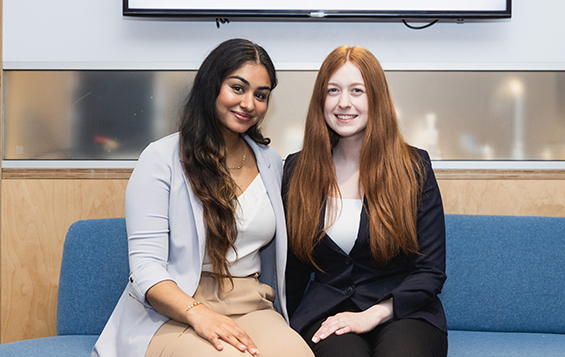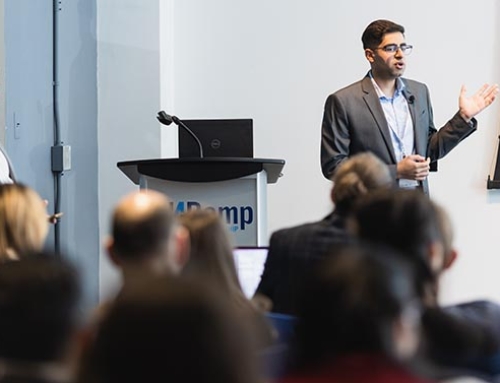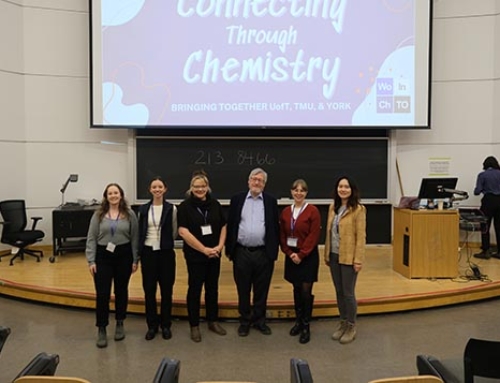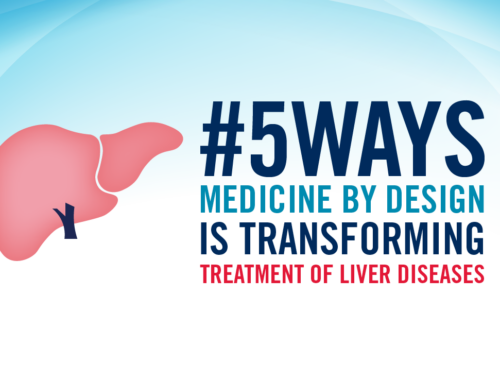
Members of Myoxa Therapeutics, the team that won $25,000 of research funding at the Building a Biotech Venture Pitch Competition (left to right): Aanshi Gandhi, Danielle Serra, Aaron Rosenstein, Maria Nguyen and Mohammad Saleh. (Photo by Neil Ta.)
The injection of lab-made, healthy cells—referred to as a cell therapy — into a damaged heart could be a way to prevent that heart from failing. But to make this therapy a reality, the cells must be able to integrate and survive in patients’ bodies. That problem is exactly what Myoxa Therapeutics, the first-place winner at the Building a Biotech Pitch Competition, is working on solving.
The cell therapy would be an alternative to a heart transplant, which people often cannot get because of the shortage of donor hearts. But a lack of oxygen, called hypoxia, to the cells can kill 90 percent of a cell therapy after it is injected.
“Myoxa’s solution is to engineer cells that sense low oxygen levels and respond by turning on protective mechanisms,” Mohammad Saleh, a PhD candidate and member of the Myoxa Therapeutics team, said in the pitch. “The value of our technology lies in the improved survival of Myoxa’s cells, translating to a more effective treatment for patients who need them.”
The Myoxa Therapeutics team also includes PhD candidates Aanshi Gandhi, Aaron Rosenstein and Danielle Serra and Maria Nguyen, a research technician. The team is part of Assistant Professor Michael Garton’s lab at the Institute of Biomedical Engineering at the University of Toronto (U of T).
Teams receive support of $25k and $10k
Thanks to their exciting product concept, potential market opportunity and high-quality science, Myoxa Therapeutics has been awarded $25,000 in funding to keep on developing their enhanced cell therapy.

Second-place team, winner of $10,000, Specifix Dx (left to right): Jaspreet Randhawa and Siobhan Wilson. Not pictured: Jessica Jenkins. (Photo by Neil Ta.)
A second team, Specifix Dx, developing a urinary tract infection (UTI) rapid test for people with spinal cord injury, has been awarded $10,000. This team includes MHSc candidates Jessica Jenkins, Siobhan Wilson and Jaspreet Randhawa in Joseph Ferenbok’s lab at the Department of Laboratory Medicine and Pathobiology at U of T.
Supporting trainees across disciplines
The Building a Biotech Venture program, now in its third year, was designed as a unique education program for trainees — which includes graduate students, post-doctoral fellows and research associates — at U of T and its affiliated hospitals who are working in regenerative or precision medicine.
The cutting-edge fields, which often overlap, focus on regenerating and repairing the body with stem cells and other living therapies (regenerative medicine), and the personalization of preventions and treatments for individual patients (precision medicine).
Prior to the pitch competition, program participants attended a series of workshops and mentorship sessions that guided them in shaping their venture. Past teams that have participated in the program have continued to develop by taking part in other pitch competitions and venture accelerators.
“The Building a Biotech Venture program fulfills several needs,” says Allison Brown, executive director at Medicine by Design, a regenerative medicine research initiative at U of T and its affiliated hospitals, one of the partners in the program. “It demonstrates how real-world innovation can come directly out of the science trainees are doing. It gives trainees a strong foundation in business concepts in the life sciences innovation ecosystem. And it kick-starts tangible innovations that teams will continue to work on and develop, and that could eventually benefit patients.”
The Precision Medicine Initiative (PRiME) at U of T — focused on tackling unmet needs in drug discovery, diagnostics and disease biology — is another partner in the program.
“Building a Biotech Venture supports PRiME’s goal of providing a cutting-edge curriculum to nurture the leading scientists and entrepreneurs of tomorrow,” says Sarah De La Rue, director of strategy and partnerships at PRiME. “In addition to helping trainees build skills and gain hands-on experience in venture creation, the program also provides an opportunity to build essential connections and networks.”
A third partner in the program, the Health Innovation Hub (H2i), provided some of the educational components of the program as well as mentorship. H2i is an on-campus incubator that has supported more than 650 ventures, generating over $320 million, at U of T since 2014.
“We’re thrilled and proud to partner with Medicine by Design and PRiME to administer this program,” says Paul Santerre, who is director at H2i and a professor, Faculty of Dentistry and the Institute for Biomedical Engineering at U of T. “Building a Biotech Venture is a key step in the commercialization pathway for those looking to translate their cutting-edge research in regenerative or precision medicine into impactful, sustainable and successful ventures.”
Innovation experts selected the winners
Four judges with a range of experience in areas like entrepreneurship, law and venture development determined the winning pitches.
“Congratulations to both winners and all the teams on successful pitches,” said Mathew Platt, associate director and global head of venture recruitment at Creative Destruction Lab (CDL) and one of the pitch judges. “The technologies presented were exciting and the pitches were engaging. The most impressive was each team’s commitment to truly building something massive. Regardless of the outcome of the pitch competition, I strongly encourage all six teams to continue to experiment passionately, de-risk ambitiously, and continue to prove why their idea won’t fail as much as they work to prove why it will succeed. I hope to see their applications to CDL in the future.”
The other judges included Angela MacDonald, entrepreneur-in-residence at Versant Ventures; Gary Margolis, chief executive officer, Notogen; and Robin Quirk, vice president, technology sourcing & venture development at CCRM.
About Medicine by Design
Medicine by Design builds on decades of made-in-Canada excellence in regenerative medicine dating back to the discovery of stem cells in the early 1960s by Toronto researchers James Till and Dr. Ernest McCulloch. Medicine by Design is made possible thanks in part to a $114-million grant from the Canada First Research Excellence Fund.





